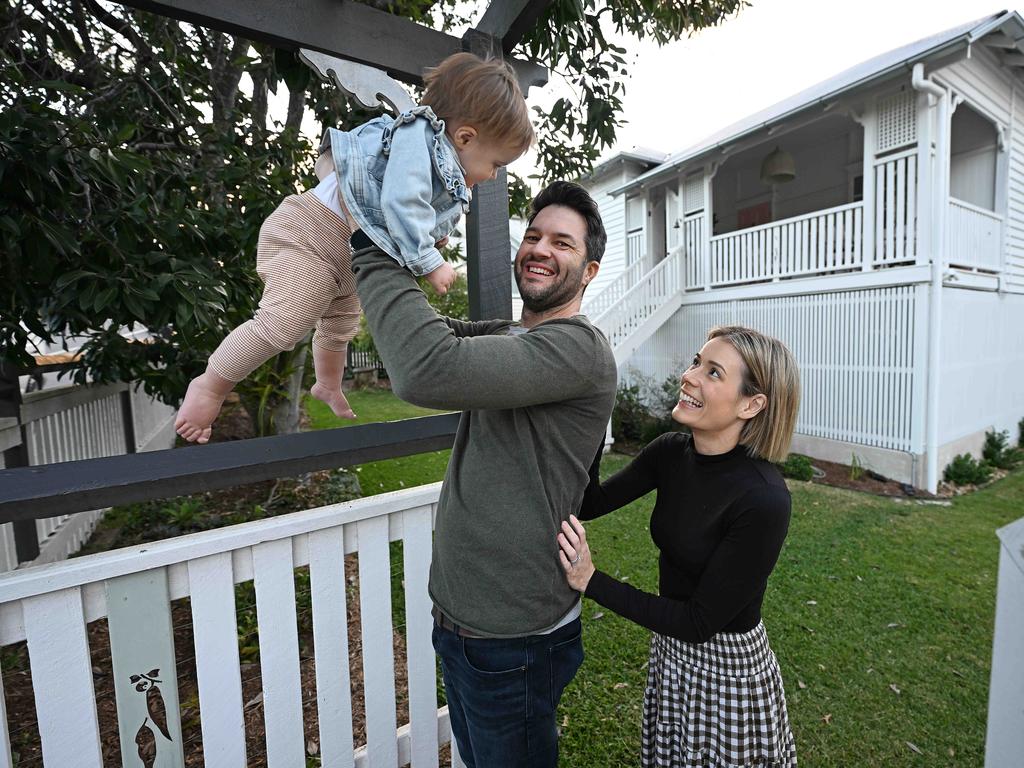Mortgage holders should expect a big hit to the hip pocket by next year: JP Morgan
Rising interest rates will put a big dent in the disposable income of Australians with a mortgage, sparking fear among consumers, but there is some good news.
The average household with a mortgage will cop at least a $6000 hit to their disposable income by mid-next year and possibly as much as $10,000, according to investment bank JP Morgan, as interest rates bite.
And spending intentions are already starting to slide, with rising grocery prices and high petrol prices at the top of consumers’ list of worries.
JP Morgan, in its report called “Gimme Shelter”, says while Australians are in pretty good shape regarding savings levels, they are fearful of the future.
“The prevailing consumer mindset … is more akin to what one would expect in a far more constrained environment,’’ it said in the report, released on Tuesday.
“We’re plumbing depths typically associated with recessions.’’
Rising grocery costs were by far the greatest concern, with half of all survey respondents saying it was their number one worry.
“Respondents were asked to rank categories in decreasing order of concern, with grocery costs causing the greatest consternation, followed by petrol/transport costs, rising interest/mortgage costs, utilities costs, cost of retail goods and school/education,’’ the report said.
The rising cost of living was expected to impact spending on discretionary items such as clothing, with 73 per cent of respondents saying they expect to reduce spending on non-essentials due to cost of living pressures, with 36 per cent expecting a “significant decrease’’.
“Travel spend, in contrast, is set for only a modest pullback,’’ the report said.
The fear among Australian households around their financial future is translating into weakening intentions to purchase a new home, but JP Morgan said there’s also plenty to be positive about coming out of the survey.
While interest rates have already pushed higher and are likely to push further with inflation now tipped by the Reserve Bank of Australia to hit 7 per cent by the December quarter, the balance sheet of the typical Australian household is looking pretty good.
“While the Australian consumer is undoubtedly facing increasingly challenging conditions, it is also entering this period in an incredibly strong position,’’ JP Morgan said.
“The savings rate, for instance, is still more than double the 30-year average.
“What’s more, the share of household income required to service interest costs is at an all-time low.
“The current level is nearly two-thirds below the peak recorded in September 2008.
“This suggests that households are well-positioned to absorb the impact of higher interest rates.’’
AMP Capital chief economist Shane Oliver said the level of household debt in Australia had risen dramatically over the past three decades and was high compared to other countries, but the elevated debt level had not yet been a major issue.
“But a potential trigger is now upon us again with rising interest rates,’’ Dr Oliver said.
“At one extreme some see rising interest rates and high household debt as setting the scene for a perfect storm of a surge in mortgage stress, forced selling and a crash in property prices causing a big hit to the economy.
“At the other extreme some point out that the household sector is actually in good shape given a surge in wealth including a big rise in bank deposits so there is no need for concern. The truth is probably in between these two extremes.’’

JP Morgan expects the nation’s official cash rate, set by the RBA, to peak at 2.6 per cent in mid-2023 – which would give rise to the $6000 shock to households’ bottom line.
Should rates push higher, towards 4 per cent as some models are projecting, the hit would be about $10,000 per year.
The cash rate target is currently 0.85 per cent, up from 0.1 per cent after two moves higher in May and June.
If official rates do peak at 2.6 per cent, “the current malaise gripping the consumer and broader market should lift’’, JP Morgan said.
But for now, consumer sentiment is weak, as is the desire to buy a house.
“The prospect of much higher interest rates is weighing heavily on sentiment in the housing market,’’ JP Morgan said.
“The number of respondents intending to purchase a dwelling in the next 12 months declined by 5 per cent from our November survey,” JP Morgan said.
JP Morgan said there are “legitimate” concerns also about the impact on house prices from interest rates, but “projections that a 20-25 per cent pullback is in the offing look extreme relative to history’’.
Over the past 30 years, the value of a household dwelling has only fallen by more than 10 per cent once, and that was when house values fell by 11 per cent during the 2008 global financial crisis.
Trips to the local hardware store are also likely become less common, with do it yourself spending appearing to have peaked, reflecting “the significant amount of DIY activity completed and the slowing housing outlook’’.
In terms of working from home, the average time spent is 2.4 days per week, with 22 per cent of people looking to do it full time.








To join the conversation, please log in. Don't have an account? Register
Join the conversation, you are commenting as Logout